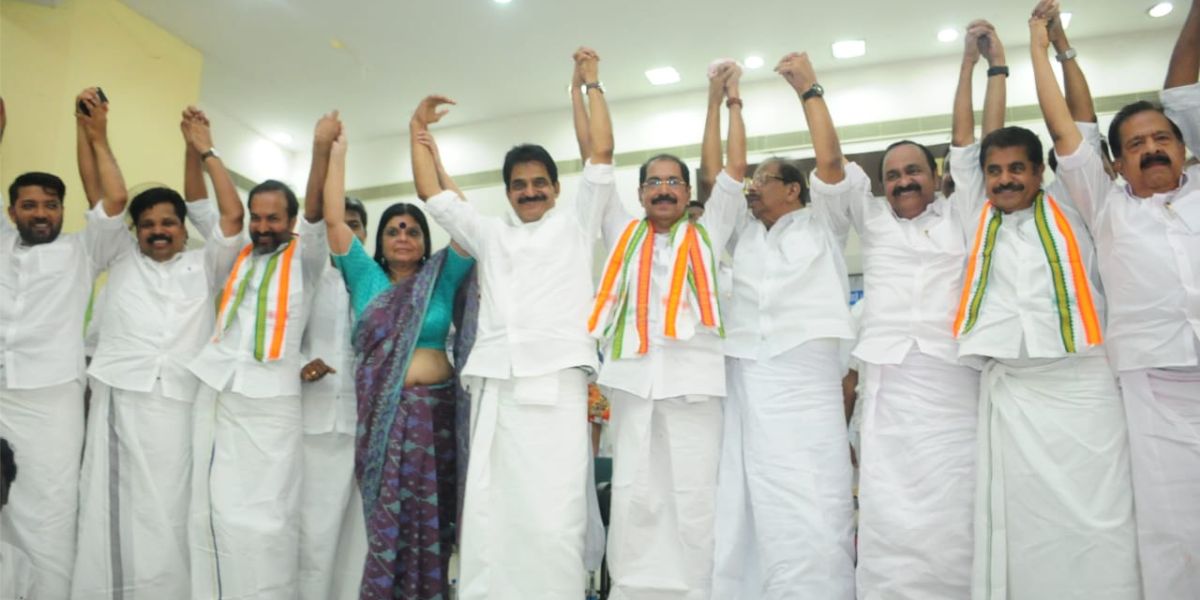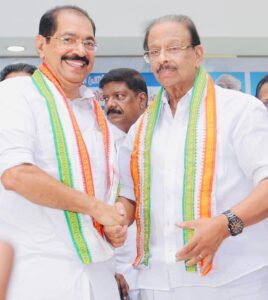The Congress in Kerala finds itself at a critical crossroads, with internal strife spilling into the open after the recent announcement of a new leadership team.
Published May 17, 2025 | 10:53 AM ⚊ Updated May 17, 2025 | 10:53 AM

Congress leaders showing a united gesture during the function on 12 May.
Synopsis: Following the appointment of a new state president, differences of opinion have emerged within the Congress in Kerala. Outgoing president K. Sudhakaran and his supporters have expressed displeasure over the decision. With the Assembly and local body elections fast approaching, the party is in urgent need of addressing internal dissent.
In the Kerala state unit of the Congress, change is often the spark that lights old fires. Barely hours after senior leaders stood shoulder to shoulder, preaching unity to a packed hall during the installation of the party’s newly named leadership, the familiar rumblings of dissent began to surface.
The All India Congress Committee (AICC) may have granted the state unit a free hand for a much-needed overhaul, but the road ahead is riddled with entrenched groupism, bruised egos, and an unrelenting tussle for dominance.
With local body polls and Assembly elections looming, the new leadership’s biggest challenge isn’t the opposition outside — it’s managing the discontent within.
The Congress in Kerala finds itself at a critical crossroads, with internal strife spilling into the open after the recent announcement of a new leadership team for the Kerala Pradesh Congress Committee (KPCC).
What was projected as a bold generational shift has instead sparked a storm of dissent, raising troubling questions about party unity and its prospects in the upcoming 2025 local body elections and the high-stakes Assembly polls in 2026.
On 8 May, the AICC unveiled a sweeping revamp of the KPCC, appointing three-time MLA Sunny Joseph as president, replacing the combative and influential K Sudhakaran.

Sunny Joseph with K Sudhakaran
Alongside, the party inducted new working presidents PC Vishnunath, Shafi Parambil, and AP Anilkumar, while Adoor Prakash was named the new UDF convener.
Framed as a strategic recalibration to infuse fresh blood and broaden social representation — balancing Nair, Dalit, and Muslim interests — the move was touted by AICC General Secretary KC Venugopal as an effort to build a “disciplined, battle-ready Congress” capable of toppling the ruling CPI(M) government.
However, the fallout was swift and sharp. Sudhakaran, a leader with a deep grassroots connect and a formidable presence in Kannur — where he has long been a thorn in the CPI(M)’s side — publicly expressed his dismay.
In a defiant statement on 15 May, Sudhakaran accused “vested interests” within the party of engineering his ouster.
He went further, claiming a senior national leader had deliberately misrepresented the state unit’s strength to the AICC, influencing the leadership change.
“What message are we sending to the ranks?” Sudhakaran asked, questioning why the high command would announce his removal after tasking him with leading the Congress into the next election battle.
“There wasn’t even a hint from the high command about this decision. I reject the reasons cited for my removal. Those who should have had my back did not protect me,” he added.
Though gracious in his remarks about Sunny Joseph, calling him “capable, talented and with better public relations skills than Anto Antony,” Sudhakaran lamented how the decision was made.
“Had the leadership committee convened and taken this call collectively, none of this bitterness would’ve erupted,” he said, squarely blaming the high command’s Kerala representative Deepa Dasmunsi for submitting a misleading and divisive report. Yet, Sudhakaran — ever the street fighter — made it clear he won’t be sidelined easily.
“My strength lies with the ranks. Even if the leadership says otherwise, the grassroots won’t abandon me. No lobby can hold back someone the people have embraced.”
Meanwhile, senior Congress leader K Muraleedharan rallied behind the outgoing KPCC president, revealing that he had personally urged the party high command not to remove Sudhakaran from his post.
Speaking to journalists in Guruvayur, Muraleedharan clarified that while Sudhakaran had a desire to continue, he gracefully accepted the decision of the high command. He asserted that Sudhakaran’s recent statements should not be viewed as a breach of discipline, noting that the leader had merely expressed certain difficulties.
Muraleedharan also pointed out that while the party leadership in Delhi has called for a generational shift, the contribution of the senior leadership should not be overlooked.
“There’s a need for change in how party affairs are communicated. Leaders should not learn about decisions through TV channels and newspapers,” he remarked, crediting Sudhakaran with having dismantled the factionalism that long plagued the Congress in Kerala.
On 12 May, new KPCC president Sunny Joseph took charge, vowing to end the LDF’s “misrule” and unite the party ahead of crucial elections. He expressed confidence in his team of working presidents, calling them “hard-working” and committed.
Yet, doubts persist over whether Sunny Joseph can truly unify the party, as public signs of discord have already surfaced.
Interestingly, during the 12 May ceremony, senior leaders repeatedly stressed the importance of unity within the party — a message Muraleedharan subtly critiqued, suggesting that unity shouldn’t just be spoken about but demonstrated through action. The cracks, however, were visible.
Several MPs and MLAs gave the event a miss, and the very next day, on 13 May, some senior leaders stayed away from a meeting convened by the AICC with the new leadership.
Now, with Sudhakaran breaking his silence three days later and speaking candidly, the simmering tensions within the Congress in Kerala have once again spilt into the open.
“This is Congress. Change is never without consequence. Every appointment leaves someone slighted, and those bruises don’t heal quickly,” a senior Congress leader told South First.
The leader further added, “The Congress doesn’t suffer from a lack of leaders, but from an excess of ambition. Unless the new leadership manages both egos and expectations, this could end up being a reset in name alone.”
The AICC may have granted the new leadership a free hand to overhaul the Congress’ organisational structure from the top down, but the real question is whether this will lead to a bold, comprehensive shake-up or just cosmetic tweaks. Adding to the challenge is the inevitable clash of bruised egos.
In Kerala, what was meant to be a fresh start through a leadership change has instead revealed the party’s underlying fragility. Sudhakaran’s removal has sparked discontent, widening factional rifts and dampening morale.
Now, the KPCC’s new team is staring at a daunting task — to stitch together a divided house, rebuild unity, and gear up for fierce battles against both the LDF and BJP.
It seems that unless the party learns to fight its battles within before taking on the enemy outside, every promise of unity will remain a fresh coat on a crumbling wall.
(Edited by Muhammed Fazil.)
